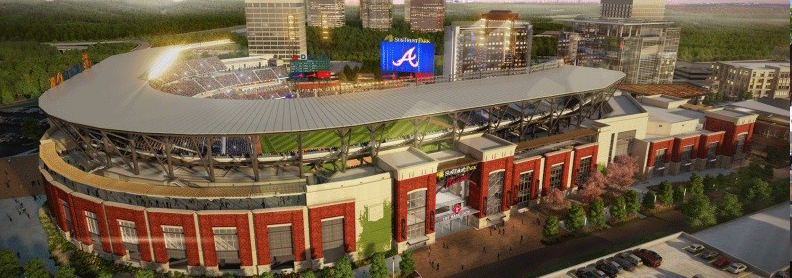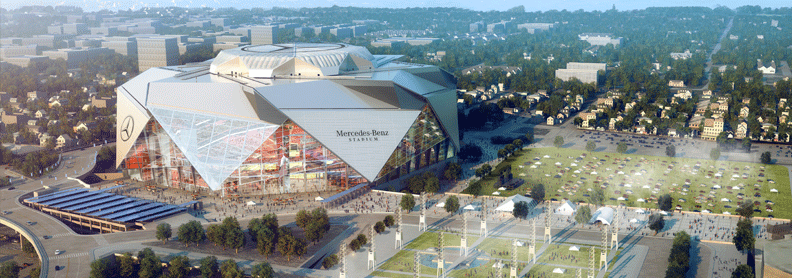
This article is part of a series on Southeast tourism.
Twenty years after the Centennial Olympic Games put Atlanta on the worldwide map, the city is positioning itself to lure more tourists, conventions, and marquee events by embarking on another big building and redevelopment boom.
Aided by the world's most travelled airport, Atlanta is on track to open $2.5 billion in new hospitality developments during the next three years, including several hotels, tourist attraction expansions, street markets, and two state-of-the-art sports stadiums.
The number of domestic visitors to the city has continued to climb. Last year, nearly 51 million people made trips to Atlanta, including 1.2 million international visitors, according to data from the city's tourism bureau. Though that figure is short of the 66 million visitors to Orlando in 2015, it tops the 9.78 million visitors to New Orleans and 13.5 million people who went to Nashville.
"The 1996 Centennial Olympic Games catapulted Atlanta into international prominence and propelled the city to a new level of growth," said Mark Vaughan, executive vice president and chief sales officer for the city's Convention and Visitors Bureau. More than $2 billion was spent building and beautifying Atlanta ahead of the Summer Games.
Pulling off the Olympics gave Atlanta credibility that is still paying off as the city wins bids to host big events such as the NCAA Final Four basketball championship and National Football League's Super Bowl.
New look downtown
Two decades later, the city is bouncing back from the recession and is seeing a resurgence as developers break ground on new apartments and overhaul historic buildings for different uses. For example, Ponce City Market, a two million square-foot mixed-use center that includes office space, shopping, apartments, and restaurants, is a former Sears, Roebuck & Co. distribution center that was the largest brick building in the Southeast. Around downtown's Centennial Olympic Park, economic development has materialized in the form of several new hotels and tourist attractions such as the College Football Hall of Fame and the Center for Civil and Human Rights.
"We've got the infrastructure that really attracts meetings and conventions," said Ken Bernhardt, a consultant and former marketing department chair at the Robinson College of Business at Georgia State University. "We have a lot people can do downtown that 15 years ago we didn't have."
Housing construction is taking off all over the city, with multifamily projects springing up from the Buckhead district north of downtown to southwestern suburbs such as College Park.
Mike Alexander, director of the Center for Livable Communities at the Atlanta Regional Commission (ARC), a planning agency, said the residential construction around the city these days is outpacing that of its suburbs, a trend driven by the continued influx of younger residents who desire in-town living. Companies know that people want to live near their jobs and be able to ride bicycles to work and so are moving into areas such as Midtown Atlanta to "create spaces where they can attract the youngest, best talent," he added. "Atlanta has remained very strong for corporate relocations and consolidations."
Atlanta's population continues to grow, aided by an improving job market. Census Bureau data show that the Atlanta metropolitan area gained more than 400,000 residents from 2010 to 2015. The area is now home to 5.7 million people (see chart 1).
Traffic jams
Amid the growth, Atlanta faces challenges. The city's traffic congestion is among the worst in the nation, and education is also an issue, since companies want a high-quality workforce. Bernhardt said the recent approval of sales tax increases that will fund street projects and expansion of bus and rail services will help address the transportation issues.
Atlanta has a diverse economy in which no one industry is dominant. Coca-Cola, Home Depot, United Parcel Service, and Delta Air Lines are some of the most well-known corporations based in the city. The area's biggest employers are trade, transportation and utilities, professional and business services, government, education and health, and leisure and hospitality companies, according to the latest monthly data from the U.S. Bureau of Labor Statistics. Most recently, the strongest employment gains in the city have come in leisure and hospitality and construction, while the biggest job decreases have been seen in mining and logging. (See chart 2 for overall jobs growth in Atlanta.)
Chad Cooley, co-founder and managing partner of AWH Partners, a New York investor, developer, and manager of hotels, said employment growth is giving Atlanta positive momentum, noting recent announcements from companies such as Mercedes-Benz, which is moving its U.S. division headquarters to the area from New Jersey by 2018. AWH Partners bought a distressed hotel in Midtown Atlanta two years ago, made upgrades and recently unveiled it as a dual-branded full-service and extended-stay hotel. Now, the property is working to gain more corporate accounts and convention business.
"We see development in all directions. We are particularly excited about the expansion of Georgia Tech, the expansion of Emory Hospital and the addition of class A residential [properties] in the neighborhood," Cooley said of Atlanta's growth. "All those things we think have the potential to create direct and immediate demand growth for our hotel."
Of the numerous development and redevelopment projects on the board or under way in Atlanta, a few stand out for their curb appeal and potential to make the city a premier business and event destination and increase tourism spending (see chart 3).
Downtown's 21-acre Centennial Olympic Park, the center of activity during the 1996 Summer Games, is set to undergo a renovation over the next few years that will add parking, a multi-use operations building, a pedestrian gateway, and an expansion of the amphitheater.
Next year, the Atlanta Braves will play in a new stadium called SunTrust Park in Cobb County northwest of the city. The venue will seat more than 41,000 and is designed to position spectators closer to the field. A nearby entertainment complex will feature a hotel, restaurants, and theater.

Photo credit: braves.com/suntrustpark
The National Football League's Atlanta Falcons will also open Mercedes-Benz Stadium next year, a 71,000-seat venue with a retractable roof and a design reminiscent of a camera lens. The downtown stadium will offer Atlanta the potential to host an additional 70 to 80 events annually, the convention and visitors bureau has said, and it will be the site of the 2018 College Football Playoff National Championship and Super Bowl LIII in 2019.






